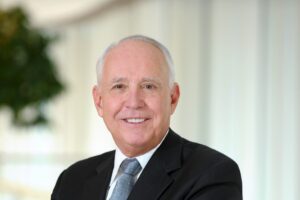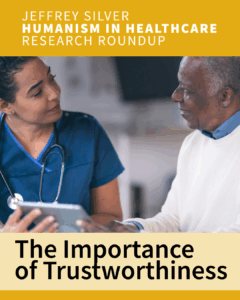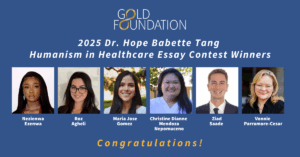Gold Foundation selects 8 summer projects designed to support humanistic care in underserved communities
The Arnold P. Gold Foundation is delighted to announce that 13 medical students have been selected as 2023 Gold Student Summer Fellows. They will be spearheading summer projects that amplify humanistic healthcare and help address health inequities through service and research projects that involve direct interaction with patients and community members.
This year’s projects touch upon a vast array of topics, including:
- Aiding patients and youth in Palm Beach County, Florida, in overcoming barriers to accessing healthy food by developing an educational program that centers community gardening as a source for sustainable, affordable, and nutritious food, in partnership with a local community organization.
- Designing fun and accessible integrated health education and recreational programming for adults with intellectual and developmental disabilities in rural New Hampshire.
- Launching an interdisciplinary HIV-prevention program at the University of Nebraska Medical Center student-run free clinics with an emphasis on reaching marginalized and underserved populations.
- Uncovering strategies for preventing pregnancy-associated sepsis-related morbidity, particularly among racial and ethnic minorities, through in-depth interviews to ensure inclusion of the lived experiences and perspectives of patients.
- Contributing to the theoretic and practical evidence base for a novel set of treatment interventions for people with Multidrug-resistant tuberculosis (MDR-TB) and HIV co-infection that will serve to both improve outcomes and maximize patient autonomy, self-efficacy, and dignity for patients in South Africa.
- Creating the first comprehensive LGBTQ+ training program for volunteers, staff, foster parents, caseworkers, and school staff in partnership with a local CASA (Court Appointed Special Advocates for Children) and developing a resource program for aging out foster youth.
- Assessing a screening program for sickle cell trait or disease among the immigrant and refugee population in Baltimore, Maryland.
- Alleviating barriers to care by providing access to a language line, sourcing medications and medical supplies, and delivering trauma-informed healthcare education to staff at a volunteer-run clinic in El Paso, Texas.
The Gold Foundation offers Gold Student Summer Fellowships annually to provide opportunities for medical students to deepen their understanding of health inequities, to advance culturally responsive care, and to direct attention toward community health needs. These research and service projects train students to become discerning and human-centered physicians while also answering the call for public health initiatives in underserved populations. The Gold Foundation is grateful to the Mellam Family Foundation for its support of this program.
“There are so many challenges in American healthcare. From burnout to the changing economy and rising health inequities, this is not a time for waiting. It is a time for action,” said Ann Bruder, Associate Vice President of Programs at the Gold Foundation. “Each of these student fellowships focuses on improving the health and well-being of underserved and underrepresented populations. The fellowships offer numerous benefits ranging from prioritizing community health to placing students in situations where they can learn from the lived experiences of patients and families. These projects will help pave the way for progress for so many families and communities.”
The 13 Gold Student Summer Fellows this year hail from 8 medical schools:

Sara Burgoa, M2, Shannon Gallup, M2, Madison Goon, M3, and Samantha Hicks, M3
Charles E. Schmidt College of Medicine at Florida Atlantic University
Project Grow: Cultivating Free Clinic Nutrition Education and Food Security through a Medical School Community Garden
This service project focuses on poor dietary intake, a major contributor to the obesity epidemic in the United States. Titled “Project Grow,” medical students Sara Burgoa, Shannon Gallup, Madison Goon, and Samantha Hicks propose utilizing produce grown in a medical student-run community garden to assist two critical populations in accessing healthy food: patients and youth. The project will be composed of three initiatives: (1) planting and maintaining a community garden, (2) using the produce to expand nutrition education at Caridad Clinic, and (3) engaging K-12 students in farm-to-table education. The initiatives will specifically center around the needs of Palm Beach County, Florida, where food insecurity disproportionately affects 1 in 10 individuals who identify as low-income and minority. About a quarter of adults living in Palm Beach County are obese, with 35% identifying as overweight. These rates are higher within the county’s Hispanic and Black populations and are elevated among school-age children. To maintain its long-term impact, the initiative will invite the participation of high schools, undergraduate organizations, and medical school interest groups, as well as infuse “Project Grow” into mandatory service-learning projects. This project can help to combat systemic barriers that have led to significant disparities in achieving wellness among underserved populations while also helping to address the food insecurity issues in Palm Beach County.
 Omar Sajjad, M2, and James Feng, M3 | Geisel School of Medicine at Dartmouth
Omar Sajjad, M2, and James Feng, M3 | Geisel School of Medicine at Dartmouth
Health Education and Enrichment Program for Adults with Disabilities in Rural New Hampshire
This service project, led by medical students Omar Sajjad and James Feng, seeks to address the systemic need for health education and social enrichment opportunities among adults with intellectual and developmental disabilities (IDDs). The project specifically focuses on residents living at Visions for Creative Housing Solutions, which provides supportive housing in the rural Upper Valley region of New Hampshire. A 2022 report released by the Centers for Disease Control and Prevention found that New Hampshire adults with IDDs were 1.5 times more likely to develop obesity, twice as likely to develop diabetes, and three times more likely to develop heart disease than adults without a disability. Accordingly, the goal of the project is to engage adults with IDDs around improved health outcomes. During the 10-week fellowship, medical students Omar Sajjad and James Feng aim to create regular interaction with an estimated 70 Visions home residents. Interactive health education and recreational activities will be organized into health-themed classes that will be reinforced through socially engaging activities with no cost to participants. Once the fellowship period ends, the project will continue as part of the Disability Advocacy Group (DAG), a student organization at the Geisel School of Medicine at Dartmouth College. The project team hopes that this initiative can be a means for future generations of medical students to continue leading change through an enduring partnership with Visions.
 Safwan Elkhatib, PhD, M4, and William Miklavcic, M2
Safwan Elkhatib, PhD, M4, and William Miklavcic, M2
University of Nebraska Medical Center
RESPECT for PrEP: Advertising and Implementing PrEP for Primary Prevention of HIV at a Student-Run Free Clinic
This service project, led by medical students Safwan Elkhatib, PhD, and William Miklavcic, together with Doctor of Pharmacy student Austin Johnson, will be launching a Human Immunodeficiency Virus (HIV)-prevention program at the University of Nebraska Medical Center’s student-run free clinics. Currently, within the state of Nebraska, there exist several barriers to effective HIV prevention and treatment: 1) a dramatic 364% increase in reported syphilis incidents between 2020 and 2021. Syphilis infection can enhance transmission of HIV through open genital sores. 2) Omaha, Nebraska’s largest city, has an extensive history rooted in discriminatory housing practices, such as redlining, which results in underserved communities living in city areas experiencing the most limited access to healthcare. HIV may no longer be an outright fatal disease, but for the 1.2 million Americans living with HIV, it still carries great medical, financial, and social burdens. HIV disproportionately affects medically underserved communities in the U.S. In 2020, 71% of new cases were diagnosed in gay men, 42% in Black Americans, and 27% in the Latinx community (representing only 3%, 12%, and 19% of the U.S. population, respectively). The most encouraging aspect of treatment are the new medications, which help safely and effectively prevent HIV infection. Through use of Preexposure Prophylaxis (PrEP) medications in at-risk patients, the risk of contracting HIV from unprotected sexual intercourse can be reduced by 99%. The project team will be composed of a group of interdisciplinary student volunteers who will first conduct an online social media advertisement campaign focused on recruiting at-risk patients from the greater Omaha area. It will also place special emphasis on reaching marginalized and underserved populations. The team of volunteers will then educate, enroll, and maintain eligible patients on PrEP medications. The prevailing hope is that the project will significantly reduce the transmission rates of HIV in the greater Omaha community and ensure that future generations of healthcare providers have the knowledge and experience to reduce the spread of HIV through PrEP.
 Alice Zhao, M2 | University of Texas Southwestern Medical Center
Alice Zhao, M2 | University of Texas Southwestern Medical Center
Training through a Novel Community-Engaged Research Project to Reduce Pregnancy-Associated Morbidity and Mortality from Maternal Sepsis in New York City
Maternal sepsis is the second leading cause of maternal death in the U.S. and disproportionately affects racial and ethnic minorities. Non-Hispanic Black women are nearly four times as likely to die from pregnancy-related causes compared to non-Hispanic white women. While the condition is largely preventable, little evidence exists on optimal strategies to identify and manage clinical and social risk factors and ensure safe, quality, and equitable maternal care during labor and delivery, as well as in the transition to postpartum. The EnCoRe MoMS study (Engaging Communities to Reduce Morbidity from Maternal Sepsis) is a novel, comprehensive, and community-engaged research project focused on reducing pregnancy-associated sepsis risk, reducing adverse outcomes, and promoting maternal health equity in New York City. The project and multi-disciplinary investigative team provide an ideal research infrastructure and career development opportunity for the fellow Alice Zhao. Through gaining experience with conducting and analyzing qualitative in-depth interviews with postpartum patients and focus group discussions with community and hospital stakeholders and participating in community engagement activities through EnCoRe MoMS’ Community Organization Leadership Advisory Board, the fellow and team will gain an understanding of the perspectives and lived experiences regarding maternal sepsis risk and the role of social determinants of health in shaping maternal health care access, outcomes, and disparities. Ultimately, findings will inform community-centered, evidence-based solutions for preventing maternal morbidity and mortality in the transition to postpartum and promoting health equity for birthing people in New York City and beyond.
 Karl Reis, M4 | Columbia University Vagelos College of Physicians and Surgeons
Karl Reis, M4 | Columbia University Vagelos College of Physicians and Surgeons
Differentiated Service Delivery for People with Multidrug-Resistant Tuberculosis and HIV Co-Infection in South Africa
Led by medical student Karl Reis, this research project will focus on individuals diagnosed with multidrug-resistant TB (MDR-TB) and HIV co-infection with the aim of contributing to the theoretic and practical evidence base for a novel set of treatment interventions. The project seeks to both improve outcomes and maximize patient autonomy, self-efficacy, and dignity. Tuberculosis (TB) is the second-leading cause of infectious disease mortality worldwide. Each year, about a half-million people develop MDR-TB. Those with MDR-TB and HIV co-infection can have dire outcomes and experience significant challenges in treatment, including stigma and socio-structural barriers. Currently, Differentiated Service Delivery (DSD), a set of interventions that adapt treatment to individual patient needs, has shown great promise in addressing issues in HIV treatment but has not been expanded to TB. The project will address this gap by 1) using empiric quantitative and qualitative data from a cohort of adults with MDR-TB and HIV co-infection in South Africa to develop a DSD framework to meet the needs of this population and 2) integrating this framework into a randomized control trial investigating the efficacy of various adherence-support interventions in improving outcomes for people with HIV and MDR-TB co-infection.
 Mary Finedore, M2 | Michigan State University College of Human Medicine
Mary Finedore, M2 | Michigan State University College of Human Medicine
Building Bridges and Creating Villages for LGBTQ+ Aging-Out Foster Youth: A Comprehensive Advocacy and Education Pilot Program
This service project seeks to address the disparities and adversity faced by two underserved subgroups of foster youth: LGBTQ+ and aging-out foster youth. Medical student Mary Finedore is partnering with Kent County CASA, a non-profit that provides Court Appointed Special Advocates for foster children and children who are wards of the state, to bridge gaps for these two subgroups in the areas of communication, education, and resource access using a two-step approach: 1) Creating CASA’s first comprehensive LGBTQ+ training program with educational and interactional materials for the trainees who will range from CASA volunteers and staff to caseworkers, foster parents, and school staff and 2) Consolidating and distributing resources to aging out foster youth. Currently, 40-50% of homeless youth hold an LGBTQ+ identity and about 30% of foster youth identify as LGBQ and 5% as transgender as compared to 11.2% and 1.17% of youth not in foster care. Additionally, each year, about 23,000 youth age out of foster care and lose the support and safety systems that had previously been in place for them. Ms. Finedore plans to build a foundation through which other initiatives can grow. She also aims to contribute to the literature on the health disparities faced by foster youth while broadening the conversation of improving the foster system through a community perspective.
 Alexis Vetack, M2 | University of Maryland School of Medicine
Alexis Vetack, M2 | University of Maryland School of Medicine
Screening for Sickle Cell Disease in Refugee, Immigrant, and Asylum Seeker from High-Risk Areas
Medical student Alexis Vetack is leading a research project that aims to improve the capabilities for early detection of Sickle Cell Disease (SCD), which can help prevent later-stage complications that include severe-pain, vascular injury, organ dysfunction, and early mortality. An estimated 5% of the world’s population has a sickle cell genetic variant with the highest prevalence being in Sub-Saharan Africa. Currently, there are approximately 2,000,000 refugees from the African continent in the United States. Maryland ranks fourth among all states in the number of immigrants from Africa living in the U.S. These statistics display the staggering prevalence of SCD in Maryland’s local refugee communities. SCD is a red blood cell disorder that affects an estimated 70,000 to 100,000 individuals in the United States. All 50 states in the U.S. currently require sickle cell screening in newborn assessments for genetic diseases. However, the policy does not mandate vaccine administration or a blood panel screening for non-communicable diseases like SCD amongst immigrants and refugee children and families who are resettled in the U.S. The study will be conducted in Baltimore, Maryland, at the University of Maryland Medical Center. The participants include children and individuals between 1-20 years of age who are immigrants, refugee, and asylum seekers from high-risk countries located in the regions of Africa, the Mideast, the Caribbean, and India. HEAL Refugee Health and Asylum Collaborative will help to recruit subjects through referral assistance. Ms. Vetack will utilize a low-cost, hemoglobin screening to assess whether the subjects in Baltimore and the surrounding area have a previously undiagnosed sickle cell trait or disease. The data that will be collected from subjects will include demographic information, past medical history, and current medical care. Individuals who are identified as having SCD will be advised on appropriate treatment centers and next steps. Following the screening process, primary care givers will be given a validated survey tool to explore if healthcare access barriers were present in preventing patients from obtaining the care they needed.
 Medha Palnati, M2 | Albany Medical College
Medha Palnati, M2 | Albany Medical College
Addressing Social Determinants of Health and Healthcare Access for the Refugee Population through Trauma Informed Care at the Juarez/El Paso Border
This service project aims to alleviate the significant barriers to care that the vulnerable migrant/refugee community is facing at the Juarez, Mexico/El Paso, Texas, U.S. border. In addition, to considerable trauma, there are also a host of other social determinants of health, which include language barriers, illiteracy, poor health literacy, generational trauma, governmental distrust, addiction, structural racism, discrimination, and socioeconomic inequity. Medical student Medha Palnati will work with Clinica Hope, a community partner which offers free, accessible shelter and healthcare to those at the U.S./Mexican border. Ms. Palnati is using the current literature, as well as her experiences as a patient advocate for migrant/refugee families as the basis for her efforts. In the summer of 2020, she volunteered in Juarez, Mexico for “Annunciation House,” an organization that was created in the early 1980s by Catholic priests in El Paso, Texas. The organization’s mission is to provide housing for the undocumented migrants who made ends meet on the streets of the city. Ms. Palnati will utilize a multi-pronged method of aiding the community through a series of proactive measures, which will include access to a language line for Clinica Hope, funding for medications and medical supplies at the clinic, and trauma-informed healthcare education for the clinic’s providers. This project can help to create the economic and social infrastructure for proactively addressing growing health inequities at the border.
Learn more about Gold Student Summer Fellowships. If you are interested in supporting or endowing a fellowship, please reach out to Pia Pyne Miller at pmiller@gold-foundation.org.


